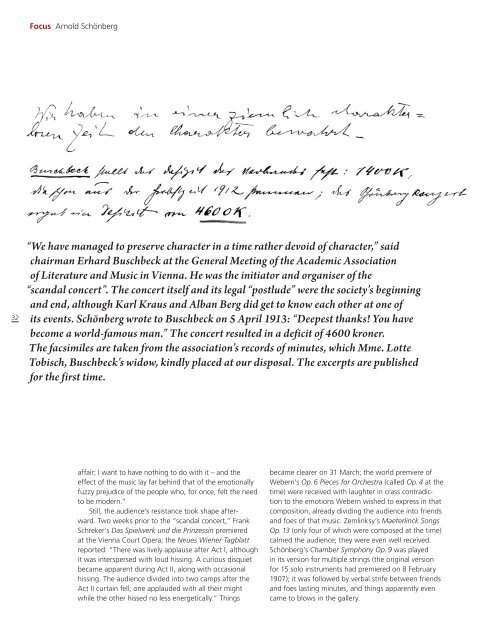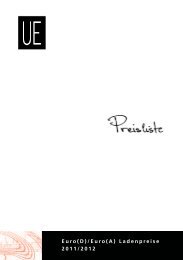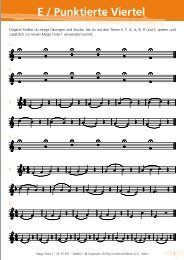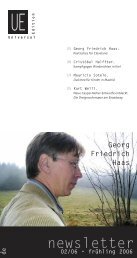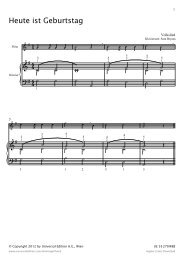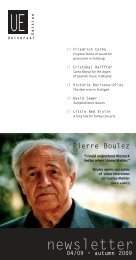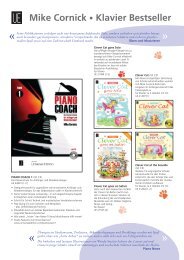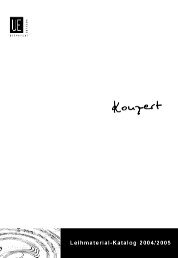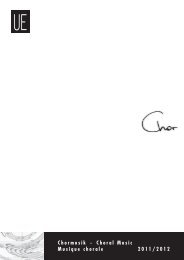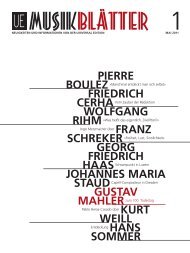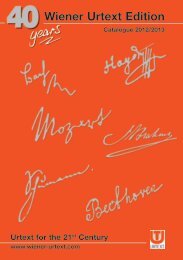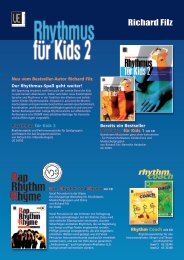Download a PDF file - Universal Edition
Download a PDF file - Universal Edition
Download a PDF file - Universal Edition
You also want an ePaper? Increase the reach of your titles
YUMPU automatically turns print PDFs into web optimized ePapers that Google loves.
32<br />
focus Arnold Schönberg<br />
“We have managed to preserve character in a time rather devoid of character,” said<br />
chairman Erhard Buschbeck at the General Meeting of the Academic Association<br />
of Literature and Music in Vienna. He was the initiator and organiser of the<br />
“scandal concert”. The concert itself and its legal “postlude” were the society’s beginning<br />
and end, although Karl Kraus and Alban Berg did get to know each other at one of<br />
its events. Schönberg wrote to Buschbeck on 5 April 1913: “Deepest thanks! You have<br />
become a world-famous man.” The concert resulted in a deficit of 4600 kroner.<br />
The facsimiles are taken from the association’s records of minutes, which Mme. Lotte<br />
Tobisch, Buschbeck’s widow, kindly placed at our disposal. The excerpts are published<br />
for the first time.<br />
affair; I want to have nothing to do with it – and the<br />
effect of the music lay far behind that of the emotionally<br />
fuzzy prejudice of the people who, for once, felt the need<br />
to be modern.”<br />
Still, the audience’s resistance took shape afterward.<br />
Two weeks prior to the “scandal concert,” Frank<br />
Schreker’s Das Spielwerk und die Prinzessin premiered<br />
at the vienna Court opera; the Neues Wiener Tagblatt<br />
reported: “There was lively applause after Act I, although<br />
it was interspersed with loud hissing. A curious disquiet<br />
became apparent during Act II, along with occasional<br />
hissing. The audience divided into two camps after the<br />
Act II curtain fell; one applauded with all their might<br />
while the other hissed no less energetically.” Things<br />
became clearer on 31 March; the world premiere of<br />
Webern’s Op. 6 Pieces for Orchestra (called Op. 4 at the<br />
time) were received with laughter in crass contradiction<br />
to the emotions Webern wished to express in that<br />
composition, already dividing the audience into friends<br />
and foes of that music. Zemlinksy’s Maeterlinck Songs<br />
Op. 13 (only four of which were composed at the time)<br />
calmed the audience; they were even well received.<br />
Schönberg’s Chamber Symphony Op. 9 was played<br />
in its version for multiple strings (the original version<br />
for 15 solo instruments had premiered on 8 February<br />
1907); it was followed by verbal strife between friends<br />
and foes lasting minutes, and things apparently even<br />
came to blows in the gallery.


